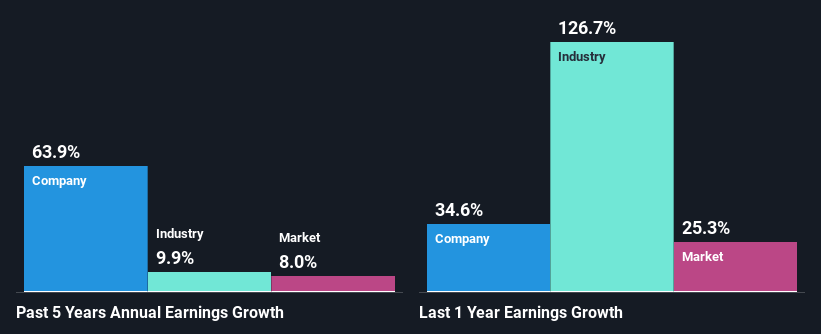Supermarket Income REIT plc (LON:SUPR) Stock's Been Sliding But Fundamentals Look Decent: Will The Market Correct The Share Price In The Future?
Supermarket Income REIT (LON:SUPR) has had a rough three months with its share price down 18%. However, the company's fundamentals look pretty decent, and long-term financials are usually aligned with future market price movements. Specifically, we decided to study Supermarket Income REIT's ROE in this article.
ROE or return on equity is a useful tool to assess how effectively a company can generate returns on the investment it received from its shareholders. Put another way, it reveals the company's success at turning shareholder investments into profits.
See our latest analysis for Supermarket Income REIT
How Is ROE Calculated?
ROE can be calculated by using the formula:
Return on Equity = Net Profit (from continuing operations) ÷ Shareholders' Equity
So, based on the above formula, the ROE for Supermarket Income REIT is:
7.7% = UK£110m ÷ UK£1.4b (Based on the trailing twelve months to June 2022).
The 'return' is the profit over the last twelve months. One way to conceptualize this is that for each £1 of shareholders' capital it has, the company made £0.08 in profit.
What Has ROE Got To Do With Earnings Growth?
We have already established that ROE serves as an efficient profit-generating gauge for a company's future earnings. We now need to evaluate how much profit the company reinvests or "retains" for future growth which then gives us an idea about the growth potential of the company. Generally speaking, other things being equal, firms with a high return on equity and profit retention, have a higher growth rate than firms that don’t share these attributes.
A Side By Side comparison of Supermarket Income REIT's Earnings Growth And 7.7% ROE
On the face of it, Supermarket Income REIT's ROE is not much to talk about. A quick further study shows that the company's ROE doesn't compare favorably to the industry average of 13% either. However, we we're pleasantly surprised to see that Supermarket Income REIT grew its net income at a significant rate of 64% in the last five years. Therefore, there could be other reasons behind this growth. Such as - high earnings retention or an efficient management in place.
We then compared Supermarket Income REIT's net income growth with the industry and we're pleased to see that the company's growth figure is higher when compared with the industry which has a growth rate of 9.9% in the same period.
Earnings growth is an important metric to consider when valuing a stock. The investor should try to establish if the expected growth or decline in earnings, whichever the case may be, is priced in. By doing so, they will have an idea if the stock is headed into clear blue waters or if swampy waters await. Is SUPR fairly valued? This infographic on the company's intrinsic value has everything you need to know.
Is Supermarket Income REIT Using Its Retained Earnings Effectively?
Supermarket Income REIT has a very high three-year median payout ratio of 82%. This means that it has only 18% of its income left to reinvest into its business. However, it's not unusual to see a REIT with such a high payout ratio mainly due to statutory requirements. In spite of this, the company was able to grow its earnings significantly, as we saw above.
Moreover, Supermarket Income REIT is determined to keep sharing its profits with shareholders which we infer from its long history of five years of paying a dividend. Our latest analyst data shows that the future payout ratio of the company is expected to rise to 101% over the next three years. Consequently, the higher expected payout ratio explains the decline in the company's expected ROE (to 5.6%) over the same period.
Conclusion
Overall, we feel that Supermarket Income REIT certainly does have some positive factors to consider. While no doubt its earnings growth is pretty substantial, we do feel that the reinvestment rate is pretty low, meaning, the earnings growth number could have been significantly higher had the company been retaining more of its profits. With that said, the latest industry analyst forecasts reveal that the company's earnings growth is expected to slow down. To know more about the company's future earnings growth forecasts take a look at this free report on analyst forecasts for the company to find out more.
Have feedback on this article? Concerned about the content? Get in touch with us directly. Alternatively, email editorial-team (at) simplywallst.com.
This article by Simply Wall St is general in nature. We provide commentary based on historical data and analyst forecasts only using an unbiased methodology and our articles are not intended to be financial advice. It does not constitute a recommendation to buy or sell any stock, and does not take account of your objectives, or your financial situation. We aim to bring you long-term focused analysis driven by fundamental data. Note that our analysis may not factor in the latest price-sensitive company announcements or qualitative material. Simply Wall St has no position in any stocks mentioned.
Join A Paid User Research Session
You’ll receive a US$30 Amazon Gift card for 1 hour of your time while helping us build better investing tools for the individual investors like yourself. Sign up here

